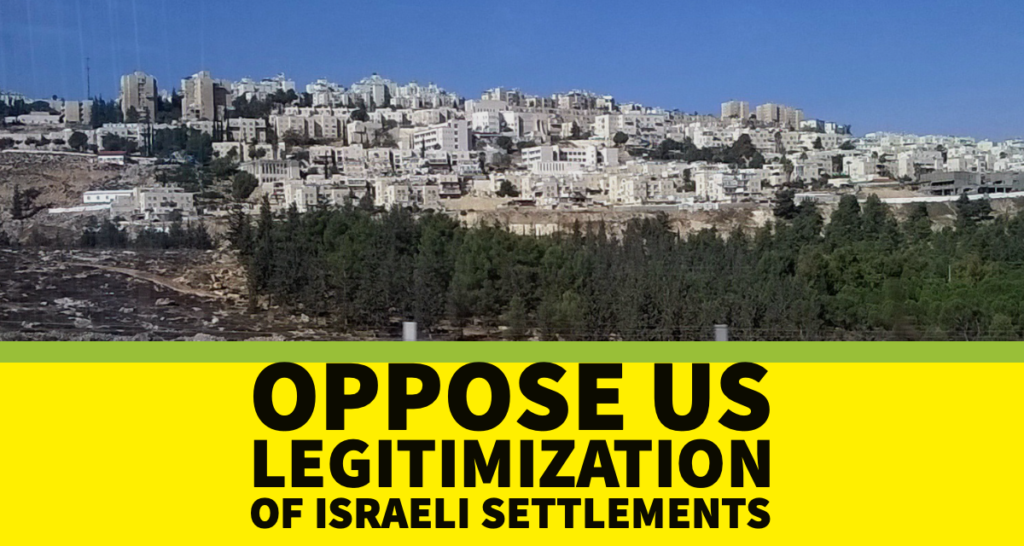3rd Thursday Alert: Oppose US legitimization of Israeli settlements
 On June 16, Israeli Prime Minister Benjamin Netanyahu unveiled a sign that reads, “Trump Heights.” The sign sits at the site of an Israeli settlement in the Golan, which Israel occupied—along with the West Bank, East Jerusalem, Gaza, and the Sinai Peninsula—during the 1967 War. Israel claimed sovereignty over the Golan in 1981 in defiance of international law, and in March of this year, President Trump recognized Israel’s claim of annexation of that land.
On June 16, Israeli Prime Minister Benjamin Netanyahu unveiled a sign that reads, “Trump Heights.” The sign sits at the site of an Israeli settlement in the Golan, which Israel occupied—along with the West Bank, East Jerusalem, Gaza, and the Sinai Peninsula—during the 1967 War. Israel claimed sovereignty over the Golan in 1981 in defiance of international law, and in March of this year, President Trump recognized Israel’s claim of annexation of that land.
Israel’s occupation of the West Bank, East Jerusalem, and the Golan, and blockade of Gaza, remain firmly in place, despite UN resolutions calling on Israel to withdraw from territories it occupied in the 1967 War.
Since that time, Israel has illegally built and expanded settlements in those areas in violation of the Fourth Geneva Convention, which prohibits an occupying force to transfer its own population into areas that it occupies. There are currently more than 650,000 Israelis living in settlements in the West Bank and East Jerusalem, as well as about 26,000 settlers in the Golan.
The Trump Administration, in addition to recognizing Israeli annexation of the Golan, has recognized Jerusalem as Israel’s capital, moved the US Embassy there from Tel Aviv, and given no indication that it recognizes Palestinian claims to any part of the city or its hope that it is also the capital of a future Palestinian state. The White House has also not pushed back against Prime Minister Netanyahu’s campaign promise in April to annex Israeli settlements in the West Bank. The US Ambassador to Israel, David Friedman, and the US Special Envoy for the Middle East, Jason Greenblatt, have both expressed their support of Israeli annexation of parts of the West Bank, including settlements. Amb. Friedman not only favors Israeli settlement construction and expansion; he has also led efforts to raise funds for the settlement of Beit El, a nationalist religious settlement near Ramallah. It remains legal for US citizens to make tax-free contributions for the construction of illegal Israeli settlements.
Previous US foreign policy convention on settlements—including the late President George H.W. Bush’s decision not to provide loan guarantees to Israel in opposition to Israel’s settlement project and President Obama’s decision not to block a UN resolution demanding a halt to settlement construction in Dec. 2016—The current US Administration’s disregard for international law is especially troubling. The US Senate has also made no effort to differentiate between Israel and Israeli-controlled areas, where the illegal settlements are located, in a bill adopted earlier this year, Senate Bill 1, the “Combatting BDS Act of 2019.” Several senators opposed the bill on the grounds that it violated US citizens’ First Amendment rights.
In late June, Palestinian and US Christians met and articulated “what would make for peace.” Among the necessary steps is the rejection of unilateral US measures, “which endanger the prospects of a comprehensive, negotiated peace settlement.” Those gathered also committed “to communicate regularly and persistently with elected officials to ensure that they know of our deep concerns with current US policy and approach, urging them to work in the interests of peace and justice, and not enact laws or policies that benefit one side at the expense of the other, or that are opposed to US and international laws.”
In these summer months, you can take that commitment seriously, acting in several ways to voice your opposition to the several ways that the US legitimizes Israeli settlements by writing or calling your elected representatives in Washington, DC; making appointments to visit their in-district offices while they are on recess from sessions in Washington, DC; and writing letters to the editor of your local newspaper expressing your view that it is in the US’ interest to support international law on the issue of settlements.
Please feel free to use this sample letter in your communication with your elected representative. You can also use this letter, and the information from the background in the alert, to draft a letter to the editor of your local newspaper.
Dear Senator/Representative,
I am deeply concerned about the accelerated pace of Israeli settlement construction and expansion, and the US Administration’s legitimization of that settlement activity, illegal under international law and conventions. It is against our country’s interest, as well as that of Israel and the Palestinians, for settlements to continue to be built and to grow.
Israel recently named a settlement in the Golan for President Trump, following his recognition of Israel’s annexation of the occupied territory. Prime Minister Netanyahu has promised to annex settlements in the West Bank. The Trump Administration has recognized Jerusalem—where there are at least 200,000 settlers living illegally—as Israel’s capital, despite UN resolutions and legitimate Palestinian claims. The US Ambassador to Israel, David Friedman, not only favors settlements but has led efforts to raise funds for their construction. All of this accords US legitimization to the Israeli settlement project, which is ongoing for more than 50 years.
I ask you to reject unilateral US actions to lend support for Israeli settlements, annexation, and occupation. I also urge you to work in the interests of peace and justice, and not enact laws or policies that benefit one side at the expense of the other, or that are opposed to US and international laws.
Republican and Democratic presidents have opposed Israeli settlement construction and expansion, and have made distinctions between Israel and Israeli-controlled occupied territories. Such an approach is consistent with American policy and international law. Please ensure that Israel is held accountable for its disregard of this approach.
Thank you for your attention to this matter, which is urgent for the lives of people, and is a matter of principle and law.

